Could you tell our readers a bit about your personal and musical background? When did you start playing music, what were your interests at that time and in which bands or projects were you involved?
Hello dear readers, I started making music in France in 2001 with a band, influenced by surrealism and dadaism, whose name can roughly be translated to English as «The Church of the Reversed Peristaltic Movement». We weren’t very good but we were noisy and irritating. We released one album, played three gigs which ended with the audience aggressively asking us to stop (usually around the fourth song), then split up. A few years later, I received a letter from a person I’d never heard about, which said: «If you’re not going to re-form your band, I’ll do it myself. Consider me as the new leader of The Church of the Reversed Peristaltic Movement». It was signed «Adrien». I loved the idea but unfortunately I don’t think the second iteration of the band ever released anything. In 2005 I formed Nick Grey & The Random Orchestra which still exists to this day. I come from a classical background at first, but have consistently been fascinated by machines, synthesizers and early electronic music, which may explain, at times, the strange stylistic associations going on within our music.
During the last years, I only noticed some records of your bands 48 Cameras and 230 Divisadero, while you didn’t release much under your own name. Since last year you’re back with two fulminant CDs with your Random Orchestra, also you moved back to the country you were born. Do you see this somehow as a new start?
Yes, it definitely is a new start. A lot has been going on these last five years, although perhaps not musically; it’s been at times tricky to find the right balance between things. I moved around quite a lot. I tried settling down, it failed, so I got myself moving again. But yes, we’re back now and one album per year is more or less the plan. We have indeed moved to Berlin six months ago, and it’s safe to say this is one of the most exciting times for us to be making music.
Is there something you regard as a new element, which seperates your work of today from earlier recordings?
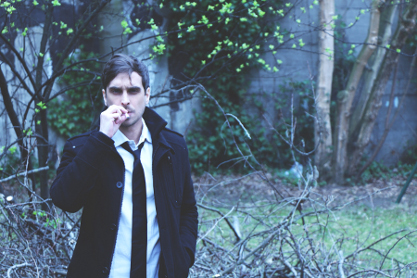 I grew tired of making music by myself, I think. „Spin Vows Under Arch“ was the culmination, for me, of a seclusion that ended up turning into bitterness. I do not tolerate bitterness in my music so it was time to stop. It was the end of the twenties, for me, as well. Turning thirty felt a bit like having finally expectorated all the residual phlegm stuck in the body since childhood. Things got much better after that but paradoxically, on the musical level, it grew a bit tricky to find «relevant» things to express. I’m very careful with this – if I don’t feel it’s relevant, or if it’s too personal, I usually throw it out. Later on, one very important event for me was meeting Louis Pontvianne, an extremely talented musician who became one of my closest friends, and with whom I’ve been working since. Not only was the communication between us very good, but we also had massive amounts of fun during the process: an exhilarating feeling I was not used to experience in association with music.
I grew tired of making music by myself, I think. „Spin Vows Under Arch“ was the culmination, for me, of a seclusion that ended up turning into bitterness. I do not tolerate bitterness in my music so it was time to stop. It was the end of the twenties, for me, as well. Turning thirty felt a bit like having finally expectorated all the residual phlegm stuck in the body since childhood. Things got much better after that but paradoxically, on the musical level, it grew a bit tricky to find «relevant» things to express. I’m very careful with this – if I don’t feel it’s relevant, or if it’s too personal, I usually throw it out. Later on, one very important event for me was meeting Louis Pontvianne, an extremely talented musician who became one of my closest friends, and with whom I’ve been working since. Not only was the communication between us very good, but we also had massive amounts of fun during the process: an exhilarating feeling I was not used to experience in association with music.
Despite the name, your band doesn’t appear as random, but it seems they all have different backgrounds, which contributes much to the variety of the music. Who are the main figures and what makes them fit into your group?
Louis Pontvianne is currently the Orchestra’s main member – he plays more or less everything very well and is, at heart, a blues musician. This is complemented by people such as Boyarin, whose approach to music is both methodic and very experimental. Sarah Maison was also with us on last year’s album and I would advise everyone to check out her wonderful songs – she does, wonderfully, one of those things I couldn’t ever dream of: sit in front of an audience with nothing but a guitar and captivate everyone. And it isn’t only because of her legs, I have great legs too. Last but not least, Peter James mixed and mastered our last works, and so much more. His input is always essential, his patience godly. To us, he is something like a therapist, a guru and a mayor – he always has the final word.
How much are they involved into the composing and songwriting process?
When I ask someone for their input, I treat that input with the utmost respect (except clarinetists, of course). There are no specific rules to the way we operate, but it usually goes like this: I record something on my own and end up convinced it’s either very good or absolute shit. In both these cases, I then call up Louis and we develop the track together (or re-work it, if it was shit to begin with, or, rarely, embrace the shit entirely). Then Louis, fed up with me, leaves and I continue working on the track by myself a little bit. At that point, either I succeed in finishing up the song or I end up re-working everything in radical and absurd ways so it turns to shit again and Louis has to come back and start all over again. Anyhow, once the track is deemed ready to go, I send it to Peter and the mixing starts. That’s one of the most stimulating parts, really – Peter is a true perfectionist and will never let go until he reaches the desired result. I think he’s a wizard… As for the other musicians involved, again, no specific rules; the track can start off with one of their interventions (for example a clarinet loop by Mr Doria which evolves into a full song), or we can integrate their playing into the arrangements later on. I hope I’m not being too boring, describing all this. I feel extremely boring right now. But you asked! Although I’m sure you didn’t know this would turn into a therapy session.
You’re just about the release an album called „Breaker of Ships“. What can you tell us about the main ideas behind it? Compared to it’s predecessing longplayer, it seems less conceptual in the sujets…
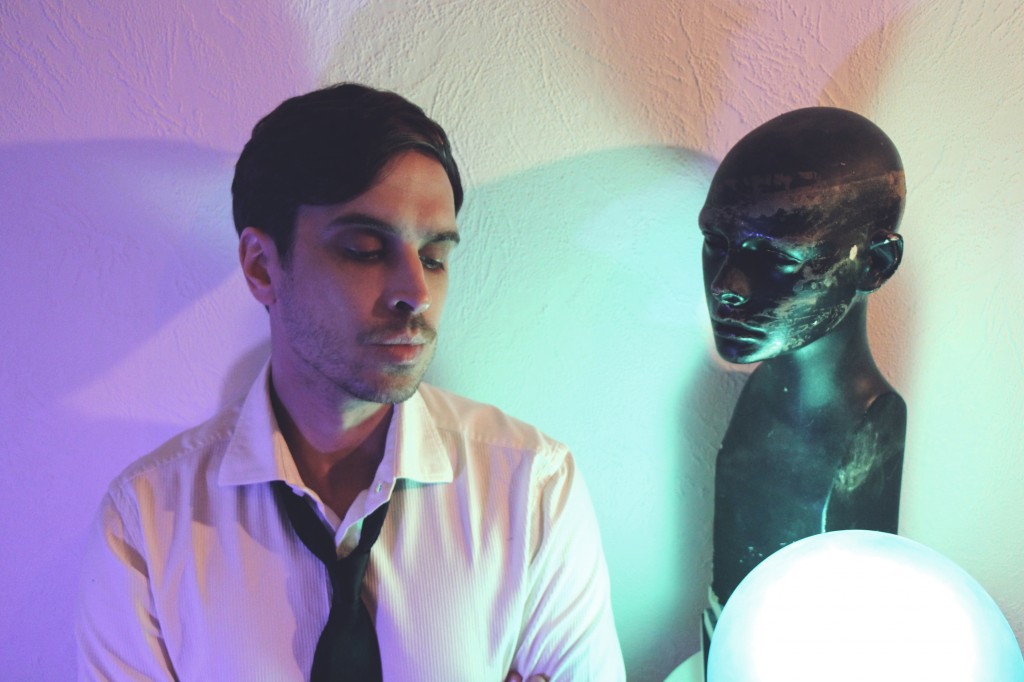 Indeed, the album wasn’t meant to be conceptual at all, but of course there’s a couple of themes holding the thing together. The main one would be ambition, or the lack thereof, and more generally life lived as a spectator (be it as a decision or a consequence of another event). The Breaker of Ships, here, is the leviathan that annihilates man’s deepest desires and ambitions, and can assume many forms, such as passivity, procrastination, fear or entertainment. In «The Archivist», the energy saved by the narrator by not «committing» to a classical way of life, and thus not needing to develop the basic social capacities one needs to advance in society – all this saved energy transforms into raw observation and archival skills which gradually turn his humanity into a complex database of information he has experienced second-hand.
Indeed, the album wasn’t meant to be conceptual at all, but of course there’s a couple of themes holding the thing together. The main one would be ambition, or the lack thereof, and more generally life lived as a spectator (be it as a decision or a consequence of another event). The Breaker of Ships, here, is the leviathan that annihilates man’s deepest desires and ambitions, and can assume many forms, such as passivity, procrastination, fear or entertainment. In «The Archivist», the energy saved by the narrator by not «committing» to a classical way of life, and thus not needing to develop the basic social capacities one needs to advance in society – all this saved energy transforms into raw observation and archival skills which gradually turn his humanity into a complex database of information he has experienced second-hand.
Similar to last year’s „Your’e Mine Again“, it combines beautiful songs with strong alienated elements, be it noisy aspects, abstract passages, foregrounded rhythms etc. I guess this is just how you like it to be, but do you also like to make your music a bit harder to digest?
Not voluntarily. Our tracks really are an illustration of what I like to hear as a listener. I suppose I like combining baroque arrangements with industrial buzzing and humming, I think it brings me back to when I was a child, following my father (a tenor) on tour. That endless succession of operas and airports…
In that context I thought of Brecht’s famous theatre related statement „Glotzt nicht so romantisch!“ („Stop gazing in such a romantic way!“). Would you be disappointed, if listeners regarde lovely songs like „Juliet of the Spirits“ only as a dreamy escapist idyll?
No, no. Once the music is released, it really doesn’t belong to me anymore and I cannot be annoyed at what people do with it. Everyone is of course free to relate to our songs in the manner that suits them best. It would be very pretentious of me, and most unpleasant, to consider my songs as something more profound than what they simply are. It is very reasonable to assume that « Juliet » will be perceived as an escapist idyll by a superficial listener. In my case, there often is a message or a theme during the writing phase, but if it gets a bit transformed once the music reaches the listener, I’m fine with it too, something new emerges, something that says more about the listener than the writer.
It seems as if you always have fun with quoting and combining elements from various music styles of past and present. Blues, chanson, traces of kraut, prog, electronica and much more – at least I as a listener have these associations. Does this just happen, or do you also act as a „fan“ who likes to refer to favourite things?
Hmm, to be honest I’m not sure. I never consciously referenced anything, at least. But it really isn’t possible to say how much I’ve been molded by my influences. If you can hear elements of various other things I’ve listened to, it seems pretty natural to me and I’m perfectly fine with it. But no, references – conscious ones – aren’t something that I find interesting.
In the case of „Juliet of the spirits“, I actually thought of the Fellini’s famous movie of the same name. How is the story behing the song? Is „Juliet of the bones“ something like it’s demystified subtext?
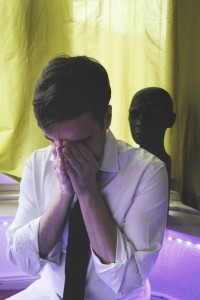 The lyrics of «Juliet Of The Spirits» – and its title – were actually written and decided by Jean Mathoul (the man behind the 48 Cameras collective). He turned sixty recently and the song is about his becoming a grandfather for the first time, to a lovely little Juliet. My own input only occurs later on, on « Juliet Of The Bones » which is indeed about demystifiying a subtext, but not the subtext to the movie. Everything between birth and passing can be classified under the « In Other News… » section, for everyone, I think ; however birth and passing are both front page items, to those involved. « Juliet Of The Bones » simply draws a parallel between Jean’s life and my own at one very precise point, the moment when he became a grandfather and I did not. These two tracks are indeed very personal, one for Jean and one for myself, they’re a bit of an exception for me as I usually don’t allow that ; however I felt it was necessary as the rest of the album was spent analysing and observing various human habits, in a non-judgemental manner of course, but still… I had to get some dirt on myself as well.
The lyrics of «Juliet Of The Spirits» – and its title – were actually written and decided by Jean Mathoul (the man behind the 48 Cameras collective). He turned sixty recently and the song is about his becoming a grandfather for the first time, to a lovely little Juliet. My own input only occurs later on, on « Juliet Of The Bones » which is indeed about demystifiying a subtext, but not the subtext to the movie. Everything between birth and passing can be classified under the « In Other News… » section, for everyone, I think ; however birth and passing are both front page items, to those involved. « Juliet Of The Bones » simply draws a parallel between Jean’s life and my own at one very precise point, the moment when he became a grandfather and I did not. These two tracks are indeed very personal, one for Jean and one for myself, they’re a bit of an exception for me as I usually don’t allow that ; however I felt it was necessary as the rest of the album was spent analysing and observing various human habits, in a non-judgemental manner of course, but still… I had to get some dirt on myself as well.
Many of your songs are based on accoustic guitar tunes, and in the past you collaborated with a number of musicians with a folk background. As several „prefix“ folk styles had a new revival some years ago – did you feel any relation to that?
No, it’s mainly due to my picking up a guitar in 2008, right after “Spin Vows Under Arch”. Upon completing that album, I grew tired of experimenting with drones, wine glasses, clarinets and abstract soundscapes and wanted to give the song form a decent try. The guitar was a good way to start anew and a good songwriting test, too. I can’t remember who said « If a song still works when played with a single guitar and vocals, then it’s a good song », but I discovered (sometimes to my dismay) that this statement is very much true.
On “You’re mine again” you dealt with the absurd side of love and relationships, your approach to the topic appeared highly ironic. What would be your best reason for never becoming a couple therapist?
As a matter of fact I think I would make a wonderful couple therapist! As proof, I can state the fact that I’m terrible at following my own advice. Couples are a funny beast. There’s something very sad and endearing about them. I’ve observed those who usually work best (although there is, of course, no strict rule, just a general impression of mine) are those who treat their association as teamwork, and grow from it, instead of those who seem to cling to the couple format mainly to ward off their individual fear of mortality. I have more affection for the second category however. And in any case – one must never, ever pass judgement on a couple other than his own because other couples follow a logic that is entirely alien, radically different from your own.
Parts of the album appear like a vast panorama of the irritating and unpredictable sides of love, eroticism and the struggle to be attractive. You said in another interview that your songs are never autobiographical, but was there something like a basic impulse or idea, that lead you to deal with this in a sometimes really comical way?
Yes, you caught me. Of course you’re right, even though the songs aren’t strictly autobiographical, the impulse behind them often is. There have been many sparks. The main one was the vision of my stepfather half-asleep, around 2 AM, on a couch in the living room, in front of a TV playing an aerobic class. The sound was turned off. My mother enters the room and starts screaming in the most amazing way, accusing him of « watching porn in [her] own house ». The man was unable to defend himself. He got thrown out of the house and had to sleep in his car for about a week. But something even more incredible happened : as he was being thrown out, my mother stuffed a large bag of trash in his hands and said to him (still screaming) : « And please take out the garbage as you go ». And he did. This defies any form of logic on any level imaginable. I can understand passion, but passion mixed up with the most basic, mundane task was something I hadn’t seen before. It was extraordinary ! And of course, later on, I got mixed up myself in the kind of semi-romantic, semi-mundane excesses I tried so hard to avoid – it’s unavoidable, genetic probably, but also quite endearing and funny and a bit sad.
There are a number of video works to your songs. As the actors are also part of the „family“, do you see the clips as an integral part of your work?
Yes, sort of. I work on our videos exclusively with my very good friend Rodolphe Gonzalès, who lives in Montreal and is an important part of my life in Canada, whenever I’m there. We have tried making music together but those moments never really worked and always seemed to end drowned in cheap beer and endless, tired conversations about the dreadful state of everything. However, the short film format appeared to suit us very well. We thus created Bouc Astral Productions for our short films and video clips. To be honest I don’t think we have an audience. The clip for « You’re Mine Again » was especially tip-toed around, at best. And I think our movie « La Fête » has been stuck around 67 views for a couple of years. Our humour may be the problem, I don’t know.
In the title track’s episodic video you show men and women missing and misunderstanding each other. The women feel left and ignored while the guys, they are waiting for, are just phlegmatic or spend their time with trying to prepare for appeoaching women. And so they all end up frustrated in their parallel worlds. As the characters appear so likeable, one wants to help them. What do you think is their problem?
Well, we ourselves are the problem. Any interaction between the characters in the « You’re Mine Again » video clip appears absolutely impossible – but even within couples you sometimes find people living in parallel worlds with their own sets of projections and illusions. Almost all of the actors in this video are part of my oldest friends. Some of them I’ve even known for about thirty years. I’ve seen them struggle, attempt, fail, succeed, fail again, many times – as they have seen me. The video was intented to be both a snapshot of a few individual’s (including myself) struggles, and a larger statement on the relationship between men and women, but as a caricature of course, a simplistic, kind, affectionate one. I’m really, really glad to hear you say you found the characters likeable – one of my fears was that the video would be perceived as judgemental, which it is not.
As we once talked you mentioned that you also admire Thomas Bernhard, which we have in common. I’m just curious what your favourite Bernhard books are…
I think that would be the one I first discovered Bernhard with : « Der Keller : Eine Entziehung ». I remember being very impressed by the title itself, and before turning to the first page I remember staring at the cover, meditating on the idea of the « Retreat », if I translate well, which is a concept that has always highly fascinated me. The closed room, seclusion behind a closed door, one type of activity going on inside, another type outside, both entirely unrelated and incompatible. I hate leaving doors open when I’m busy trying to achieve something, they fill me with some kind of uncontrollable animalistic dread. Inserting myself into an enclosed space, however, gives me the feeling that anything is possible, no matter how those existing on the other side of the separation chose to live and to operate. But back to Bernhard, I found much relief in his writing, echoes of my own occasional misanthropy and repetitive thought patterns. « Verstörung » would be a close second.
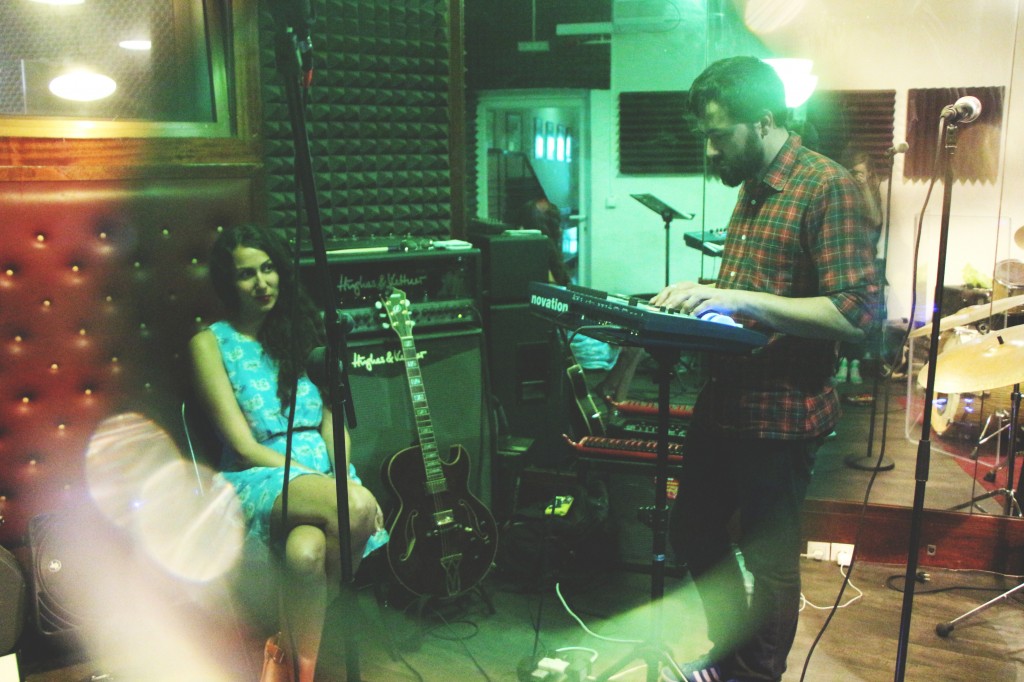 One last question about „Breaker of Ships“ – the track „Ghost Rain“ presents a striking speech of Australian activist Philip Wollen about animal exploitation in the meat industry. Maybe slaughterhouses with glass walls would lead many people to make a circuit, but I’m sure that a speech like Wollen’s could really shatter people and lead them to change their minds, if they just have to chance to hear it. Do you just like to spread the word, or is there also a more specific relation to the album as a whole?
One last question about „Breaker of Ships“ – the track „Ghost Rain“ presents a striking speech of Australian activist Philip Wollen about animal exploitation in the meat industry. Maybe slaughterhouses with glass walls would lead many people to make a circuit, but I’m sure that a speech like Wollen’s could really shatter people and lead them to change their minds, if they just have to chance to hear it. Do you just like to spread the word, or is there also a more specific relation to the album as a whole?
A little bit of both. It’s a very bleak album I think, and during the mixing process, Peter and I wanted to conclude on a glimmer of hope. He came up with the instrumental « Ghost Rain », which, if I remember correctly, he assembled from other tracks from the album, using various strange effects and wizardly devices, and adding a few field recordings of his own, as well as his tibetan bowl. I found his piece beautiful, thought it would be a fitting conclusion to the album because it was so radiant, musically and lyrically. So yes, there’s a connection to the album, in the sense that – I quote Mr Wollen – « another world is possible », despite humanity’s bloody tendency to get worse year after year, but for me it’s of course also about spreading the word, if I can. I do believe vegeterianism and veganism are immediate, feasible solutions to a very major problem. However, I also believe it’s a word that must be spread delicately and with care, as guilt-tripping the consumer will often only have the opposite effect. The human mind, nowadays, is harrassed by superfluous external stimuli to the point of exhaustion, so I can understand very well how animal rights may look like a very minor issue to some people. It’s very unfortunate, but with the right key applied to the right lock, if I may risk this cheesy analogy, a positive change can, perhaps, be set into motion.
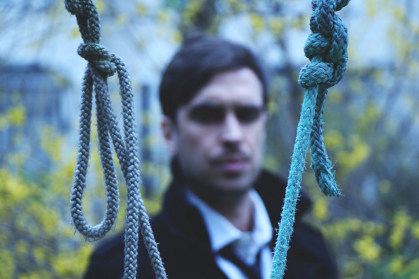 Finally, of cause, the future question.. Are there any mentionable things on your schedule? Can we expect some live shows, after the album is released?
Finally, of cause, the future question.. Are there any mentionable things on your schedule? Can we expect some live shows, after the album is released?
There should be a new EP coming later this year, and a collaboration with Empusae (a full length-album, this time) is in the works too. As for live shows, yes, absolutely. We will start off with an intimate duo formula (just Louis and myself) and will play songs from the recent albums but older material as well (all rearranged, of course). Additionally, we are looking for musicians in Berlin so – if anyone reading this would like to book us or join us, please get in touch through our website.
And dear Uwe – thank you so much for your questions!
(U.S.)
Fotos: Lysandre Cottret
